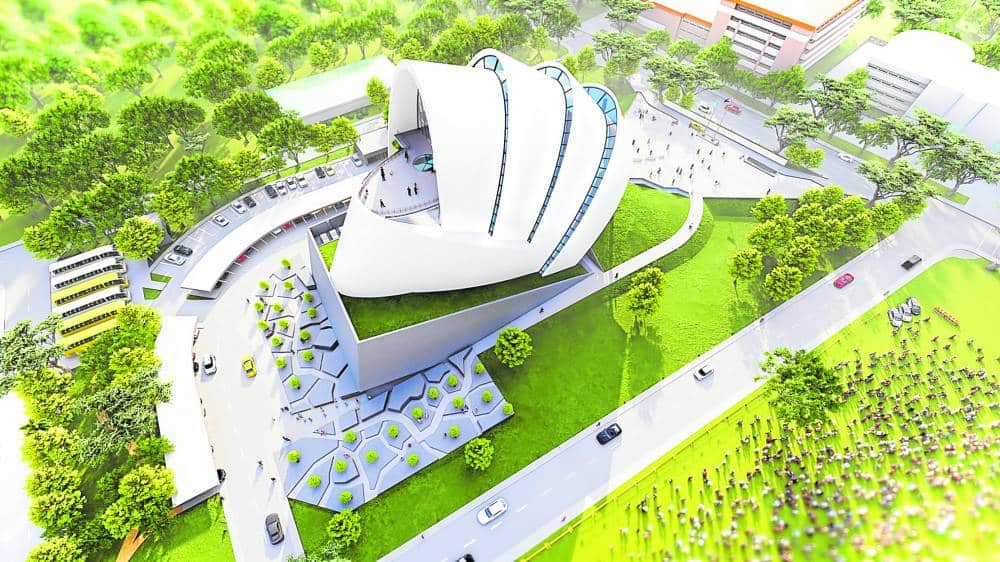
Photos of the planned Freedom Memorial Museum by the HRVVMC immortalizing the atrocities during the over 20 years of martial law imposed by the late dictator Ferdinand Marcos and showing materials during that regime. —Photo courtesy of HRVVMC
MANILA, Philippines — The University of the Philippines (UP), the bastion of student activism during the dictatorship of the late President Ferdinand Marcos Sr., has been blamed for the delay in the construction of a planned museum in honor of victims of martial law atrocities, which was supposed to have started on campus in June last year.
During Tuesday’s budget hearing at the House of Representatives led by the committee on appropriations, Human Rights Violations Victims Memorial Commission (HRVVMC) executive director Carmelo Victor Crisanto revealed that the UP administration was sitting on a turnover document giving it full control over the P80-million relocation facility built by the commission in lieu of the 1.4-hectare lot that UP had donated to the HRVVMC.
READ: Can martial law museum be built in the time of Marcos?
On that lot, the former site of the UP Campus Maintenance Office, will rise the martial law museum, also known as the Freedom Memorial Museum, which will memorialize human rights violation victims during the regime of Marcos Sr., father of incumbent President Ferdinand “Bongbong” Marcos Jr., as mandated under Republic Act No. 10368 or the Human Rights Victims Reparation and Recognition Act of 2013.
The law identifies human rights violation victims as those “whose human rights were violated by persons acting in an official capacity and/or agents of the State” committed from Sept. 21, 1972, to Feb. 25, 1986,” or the period from Marcos Sr.’s official declaration of martial law until he was ousted during the citizen-backed military uprising on Edsa or the People Power Revolution.
Crisanto said they had finished building the relocation sites for the affected UP offices in October 2022 and had given the turnover document to the university in June 2023.
“But up to now, September 2024, UP has not moved into the relocation sites, thus preventing the memorial commission from demolishing all their structures,” Crisanto said. “If I look at the number of months I’ve been delayed by UP, it’s now like 20 months.”
The HRVVMC chair added that he had met with UP President Angelo Jimenez in April when the latter promised that the university was ready to sign the document. But the plan to hold the turnover ceremony on June 12 did not materialize.
Needed document
Crisanto said that while the UP leadership appeared supportive of the museum’s construction, “I cannot understand the bureaucracy of UP and why it takes them so long to actually accept the donation when that is something that is positive for the [university]. So I cannot explain their seeming foot-dragging on this matter.”
But in a statement on Tuesday, UP, quoting UP Vice President for Planning and Development Dan Peckley, said the “main cause of delay” was the absence of the deed of transfer document, which has yet to be approved by the HRVVMC.
UP needs the deed signed by representatives of the university and the HRVVMC that will fully implement the transfer of the UP Campus Maintenance Office building, Peckley said.
The university, according to the statement, also made several queries with the commission on the document’s status in May, June, August and even on Tuesday.
“Previously, HRVVMC informed the university that the draft was still being reviewed by the Office of the Solicitor General and the Commission on Human Rights,” Peckley said in the statement.
Jimenez had already called for an emergency meeting this week to discuss the matter and “reaffirm the university’s commitment to realizing the museum.”
“We take criticisms, even harsh ones, positively as part of the difficult challenges we face but we know that at its core, it is an expression of our shared commitment to human rights,” the UP statement read, quoting Jimenez.
‘Old, dying’
While Crisanto promised to reach out to the UP leadership again, he asked the help of Congress to “nudge UP to fulfill its end of the obligation.”
In response, Gabriela Rep. Arlene Brosas moved that the panel sign a letter asking UP to explain why it was “stonewalling” on the museum’s construction.
Crisanto’s revelation comes mere weeks before the country marks the 52nd anniversary of the declaration of martial law which saw thousands of activists, human rights defenders, and journalists arrested, disappeared, or killed.
Brosas said it was all the more important to hasten the construction of the museum because “many martial law survivors are asking us: where is the Freedom Museum?”
“Many are now too old, some are already dying, and we want them to see the museum that their children and new generations could go to,” she said.
In 2023, Crisanto said that once they get clearance to build, the museum could be finished in about 18 months. Around P500 million—the interest from the P10 billion in Marcos’ ill-gotten wealth allotted by the state for reparations—has been set aside by the national treasury for its construction.
Baguio Rep. Mark Go, who is part of the UP Board of Regents (BOR) and a member of the House appropriations panel, assured Crisanto that he would bring the matter up in the BOR’s upcoming meetings.